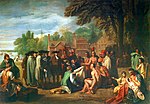User:DET00D/sandbox2
| Cherokee Nation v. Georgia | |
|---|---|
 | |
| Decided March 18, 1831 | |
| Full case name | The Cherokee Nation v. The State of Georgia |
| Citations | 30 U.S. 1 (more) 8 L. Ed. 25; 1831 U.S. LEXIS 337 |
| Holding | |
| The Supreme Court does not have original jurisdiction to hear a suit brought by the Cherokee Nation, which is not a "foreign State" within the meaning of Article III | |
| Court membership | |
| |
| Case opinions | |
| Majority | Marshall, joined by McLean |
| Concurrence | Johnson |
| Concurrence | Baldwin |
| Dissent | Thompson (joined by Story) |
| Laws applied | |
| U.S. Const. art. III | |
Cherokee Nation v. Georgia, 30 U.S. 1 (1831), was a United States Supreme Court case[1] . The Cherokee Nation sought a federal injunction against laws passed by the state of Georgia depriving them of rights within its boundaries, but the Supreme Court did not hear the case on its merits. It ruled that it had no original jurisdiction in the matter, as the Cherokee were a dependent nation, with a relationship to the United States like that of a ward to its guardian.
Background[edit]
On December 20, 1828, the state legislature of Georgia, fearful that the United States would not enforce (as a matter of Federal policy) the removal of the Cherokee people from their historic lands in the state, enacted a series of laws which stripped the Cherokee of their rights under the laws of the state. They intended to force the Cherokee to leave the state. In this climate, John Ross, Principal Chief of the Cherokee Nation, led a delegation to Washington in January 1829 to resolve disputes over the failure of the US government to pay annuities to the Cherokee, and to seek Federal enforcement of the boundary between the territory of the state of Georgia and the Cherokee Nation's historic tribal lands within that state. Rather than lead the delegation into futile negotiations with President Jackson, Ross wrote an immediate memorial to Congress, completely forgoing the customary correspondence and petitions to the President. President Adams sent the general army with a letter ordering them to stop the land survey . Georgia troops replied saying they felt it is thier duty "duty to resist to the utmost any military attack which the Government of the United States shall...make upon...Georgia,"[2]
Ross found support in Congress from individuals in the National Republican Party, such as senators Henry Clay, Theodore Frelinghuysen, and Daniel Webster, as well as representatives Ambrose Spencer and David (Davy) Crockett. Despite this support, in April 1829, John H. Eaton, the secretary of war (1829–1831), informed Ross that President Jackson would support the right of Georgia to extend its laws over the Cherokee Nation. In May 1830, Congress endorsed Jackson's policy of removal by passing the Indian Removal Act, which authorized the president to set aside lands west of the Mississippi River to exchange for the lands of Indian nations in the east.
When Ross and the Cherokee delegation failed to protect Cherokee lands through negotiation with the executive branch and through petitions to Congress, Ross challenged the actions of the federal government through the U.S. courts.
== The case
See also[edit]
Notes[edit]
References[edit]
- Anton-Herman Chroust, "Did President Andrew Jackson Actually Threaten the Supreme Court of the United States with Non-enforcement of Its Injunction Against the State of Georgia?," 4 Am. J. Legal Hist. 77 (1960).
- Kenneth W. Treacy, "Another View on Wirt in Cherokee Nation", 5 Am. J. Legal Hist. 385 (1961).
External links[edit]
 Works related to Cherokee Nation v. Georgia at Wikisource
Works related to Cherokee Nation v. Georgia at Wikisource- Text of Cherokee Nation v. Georgia, 30 U.S. 1 (1831) is available from: Findlaw Justia

